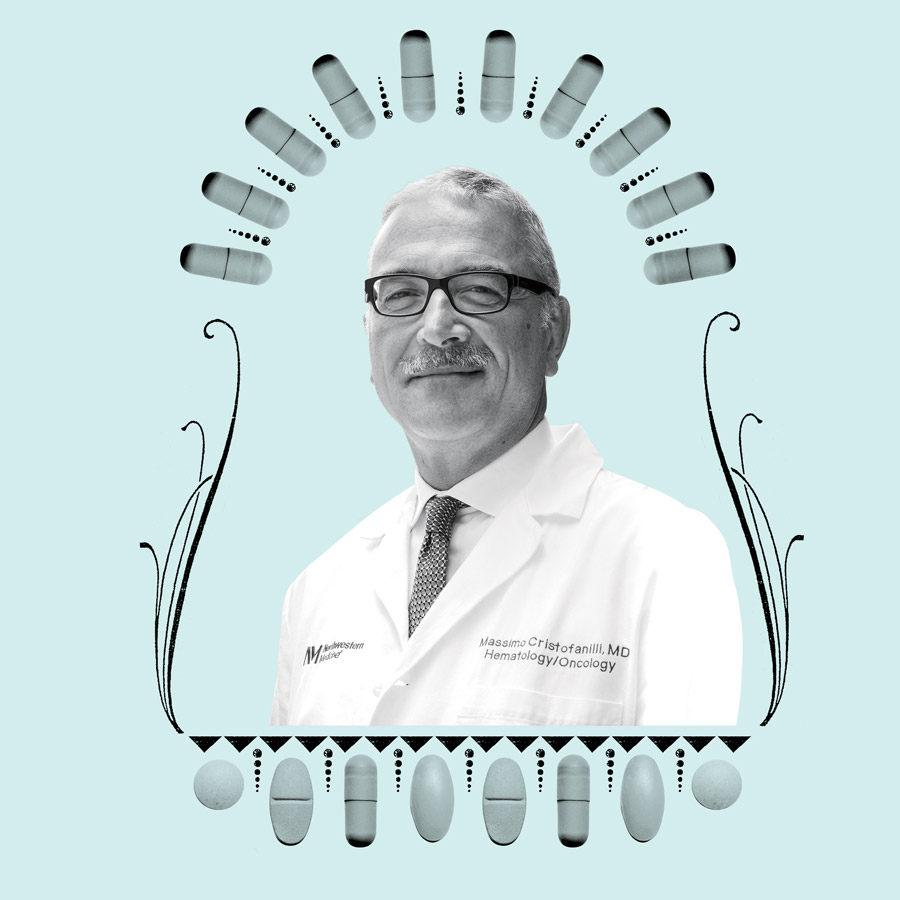
The Bespoke Cure
Five years ago, doctors might have told patients whose leukemia or lymphoma had returned that they had less than a 20 percent chance of beating it. “We don’t say that anymore,” says Patrick Stiff, division director of hematology and oncology at Loyola Medicine.
That’s because of a new treatment called CAR T-cell therapy. It involves removing a patient’s killer T cells, those that have failed to attack cancer cells, and genetically modifying them to turbocharge their functioning before injecting them back into the patient. Thanks to a landmark 2017 study that Stiff took part in, the FDA has approved CAR T-cell therapy for pediatric leukemia and adult lymphoma patients.
Now, in a farm-to-table-like twist, Stiff and his team aim to produce the CAR T cells in Loyola’s own labs, rather than relying on pharmaceutical companies for the genetic engineering. The goal: creating purer cells to reduce the treatment’s side effects, such as high fevers, confusion, and even death, and, in turn, its cost. Clinical trials with these homegrown cells—the first of their kind in the Chicago area—should begin by year’s end.

The Cancer Disarmer
Non-Hodgkin’s lymphoma is often a particularly crafty form of cancer, creating proteins that throw the body’s natural killers off its scent. A drug known as 5F9 binds to these proteins, unmasking the tumors so they can be vanquished. By combining 5F9 with an existing cancer medication, rituximab, doctors at UChicago Medicine are taking this one step further: harnessing patients’ own macrophages, a type of immune system cell, to attack the tumors they normally bypass.
In an early clinical trial, the drug eliminated all signs of the often-fatal cancer in eight out of 22 patients—including some who’d already tried up to 10 other types of therapy. “Outside of telling someone they are cured from cancer, this is the absolute best part of clinical research,” says Sonali Smith, director of UChicago Medicine’s lymphoma program and a senior author of the study.

The Life Sustainer
Chemotherapy will probably always have a place in an oncologist’s armamentarium. But soon women with breast cancer—even advanced cases that have returned and spread—will have less toxic options. Case in point: the drug palbociclib. It’s one of a newer class of medications called CDK4/6 inhibitors that interfere with the enzymes that govern cell division, interrupting the growth of malignancies.
A clinical trial led by Massimo Cristofanilli, associate director for translational research at the Robert H. Lurie Comprehensive Cancer Center of Northwestern University, showed that, when combined with a standard hormone therapy, palbociclib slows cancer’s spread. And it has none of the serious side effects of chemo, like hair loss and debilitating infections.
Cristofanilli and his colleagues are now studying whether palbociclib can work in earlier stages of the disease, when it might have an even greater benefit. Although doctors don’t use the word “cure” for these types of cancers, he says, “ideally you can prolong life and treat this as a chronic disease, just taking pills, having essentially a normal life.”

The Fertility Saver
These days, an estimated four in five children with pediatric cancers will survive and live to adulthood. And if Erin Rowell has anything to do with it, they’ll have the choice to start families.
As director of the fertility program at the Ann & Robert H. Lurie Children’s Hospital of Chicago, Rowell has helped pioneer a procedure to remove and freeze ovarian tissue in girls as young as 5 months before they undergo treatments that would destroy it. The feat involves retrieving a child-size ovary, sometimes less than a centimeter in diameter, without damaging the tens of thousands of eggs tethered to it; this is done by grabbing onto surrounding tissue, then slipping the organ into a surgical bag and out through the bellybutton.
Rowell and her team published a paper this year detailing the cases of 64 patients since 2011. None of these patients have tried to get pregnant yet, but two healthy babies have reportedly been born to patients undergoing a similar procedure in Europe. Failing to address the ability of cancer survivors to have their own children can be “very damaging psychologically,” Rowell says. “We don’t want to miss an opportunity.”


